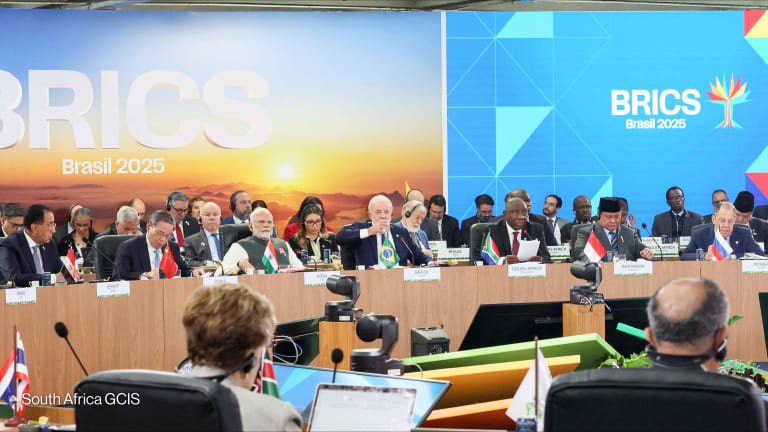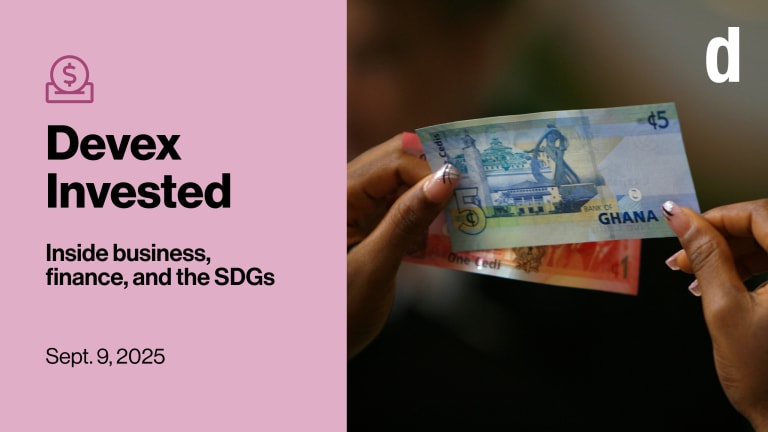Opinion: The Sustainable Development Goals won’t happen without a radical economic rethink

The Sustainable Development Goals are ambitious objectives; business as usual will not deliver them. Speaking on the recent International Day for the Eradication of Poverty, U.N. Secretary-General António Guterres acknowledged the need for new thinking. “The pledge to leave no one behind will require innovative approaches, partnerships, and solutions,” he said. But this new model will only come about if we radically reshape the national, regional, and global economies that lie behind many of the obstacles to achieving the SDGs. We must rethink the way we govern and manage the global financial and economic system.
In part, that means rethinking the current trend to treat private finance as the default option for development. Private finance is being heavily touted by the World Bank, the G20, and others as the solution to the SDG financing gap — for example, through their enthusiastic promotion of public-private partnerships. Yet international private capital has proven volatile and is often short term. In fact, since 2015, international private finance has been net negative for developing countries — more money has been flowing out than in. This volatility has led some developing countries to protect themselves from external shocks by building up massive reserves. This is a sensible strategy given the lack of faith those countries have in the IMF and other global institutions to protect them in times of crises. However, in practice they build reserves by buying safe assets from developed countries. In other words, the poorer countries are lending trillions of dollars to the richest countries, particularly the U.S., at very low rates of interest.
The issue is therefore not how to get more global capital to flow south, but how to make sure that this results in high-quality investments and that developing countries have the tools they need to manage the risks. Most importantly, developing countries also need to make the best use of their own private financial resources, which are almost always several magnitudes larger than foreign capital. Sadly, international rules and institutions too often restrict rather than enhance developing countries’ efforts to make the best use of private finance. For example, the WTO does not allow companies to apply subsidies linked to sourcing domestically or to export performance, and the proliferation of bilateral trade and investment agreements restricts the use of procurement and competition policies to promote domestic industries. The increasing power of investor-state dispute provisions in these treaties gives multinationals the power to challenge governments’ efforts to promote domestic industries and to protect basic human rights.
The prevailing global financial end economic system also works against poorer countries’ efforts to fund their own development by raising domestic public finance, principally through taxation. Domestic public finance — principally tax revenue — is by far the largest development finance resource for those developing countries, dwarfing international private and public flows combined. Developing countries have significantly improved tax collection in recent years. However, they naturally have a limited tax base because of high levels of poverty, and this already-limited base has been hurt by a trend to reduce taxes on multinationals by offering generous tax incentives in a destructive “race to the bottom” to woo foreign investors. Even worse, significant tax revenues are also lost through tax havens, intracompany operations within multinational corporations, and the secret transfer of financial resources out of the global south. As a result, there are significant public resource shortfalls for basic services, social protection, and infrastructure — particularly in least developed countries.
International public financial flows — the money sent from donor to recipient countries — are supposed to help fill this gap. But the figures are confusing, as they include large amounts of money that never leave the donor country, such as administrative expenses and the costs of accommodating refugees. What is clear is that these flows have been lower than stated, less than promised, and have proven volatile and subject to changing priorities in developed countries.
The architecture of global economic governance has been slow to change. There are major gaps, including the absence of any mechanism to prevent and resolve debt crises, which have sadly become a common occurrence. In addition, the majority of developing countries are either excluded from, or have a limited voice in, global rule setting, thereby seriously weakening the quality of those rules. Despite some notable achievements, secrecy and opacity — as opposed to transparency and openness — remain the norm at international financial institutions.
It is clear that the global economic and financial system is severely hindering development progress and that radical changes will be needed if we are to meet the higher level of ambition the SDGs demand. All too often the blockers of reform are the rich countries, which can be accused of “kicking away the ladder” that could allow developing countries to chart their own paths to prosperity. The SDGs set a universal agenda that applies to all countries. If developed nations are to take the SDGs seriously, they need to show they are willing to make the necessary fundamental reforms to the global financial and economic system. As a new report from Eurodad sets out, this would mean changes at home, such as cracking down on the tax havens that are conduits for the loss of resources from the global south. It would also mean a new model of international cooperation, where, for example, the countries with major financial centers support rather than oppose sensible reforms such as the creation of a mechanism to rapidly and fairly resolve debt crises. The benefits of these reforms would be felt at home as well as abroad.
The SDGs represent a step change in global ambitions. If they are to be met, they require a step change in efforts to reform the global financial and economic system.
Join the Devex community and access more in-depth analysis, breaking news and business advice — and a host of other services — on international development, humanitarian aid and global health.
Search for articles
Most Read
- 1
- 2
- 3
- 4
- 5








